Garmin Venu 3 vs Samsung Galaxy Watch 7: Don't make a mistake!
We may earn a commission if you make a purchase from the links on this page.

Intro
The Galaxy Watch 7 is the big name when it comes to smartwatches for Android phones, but while Samsung's watch excels in the smarts, Garmin is the brand that most sporty people gravitate towards. The Venu 3 is the smartest sports watch by Garmin, so it's only natural to compare these two.
Let's start with the big difference – battery life. The Galaxy Watch 7, despite promises for battery life improvements, is still a watch you have to charge every single day. That is not the case with the Garmin Venu 3, which easily lasts around four days with the screen always on, and more than a week if you turn off the Always On feature. That is a massive difference, especially considering that the Venu has a beautiful OLED screen, just like the Galaxy.
The Venu 3 even has a microphone and can take and place calls (via a phone) and it can connect to your phone's voice assistant. But it's not a true smartwatch: it runs on a proprietary platform and you cannot install apps on it like you can on the Galaxy.
These are just some of the differences, so let's dig deeper to find out which one is the better choice for you.
Garmin Venu 3 vs Samsung Galaxy Watch 7: features and differences
- Both watches come in small and large sizes
- Both are round and have OLED screens
- Galaxy runs Wear OS, Garmin has a basic proprietary OS
- Four to ten days battery life on Garmin, one-day battery on Samsung
- Garmin charges with proprietary cable, Samsung uses magnetic charging puck
- Galaxy Watch 7 review
- Garmin Venu 3 vs Apple Watch Series 10: Which one should you go for?
- Apple Watch Series 10 vs Samsung Galaxy Watch 7: preview of the upcoming battle
- Samsung Galaxy Watch 7 vs Galaxy Watch 6: Not much of an upgrade
Table of Contents:
Design & Sizes
The Galaxy uses more premium materials, but the Garmin weighs less and feels a bit more comfortable
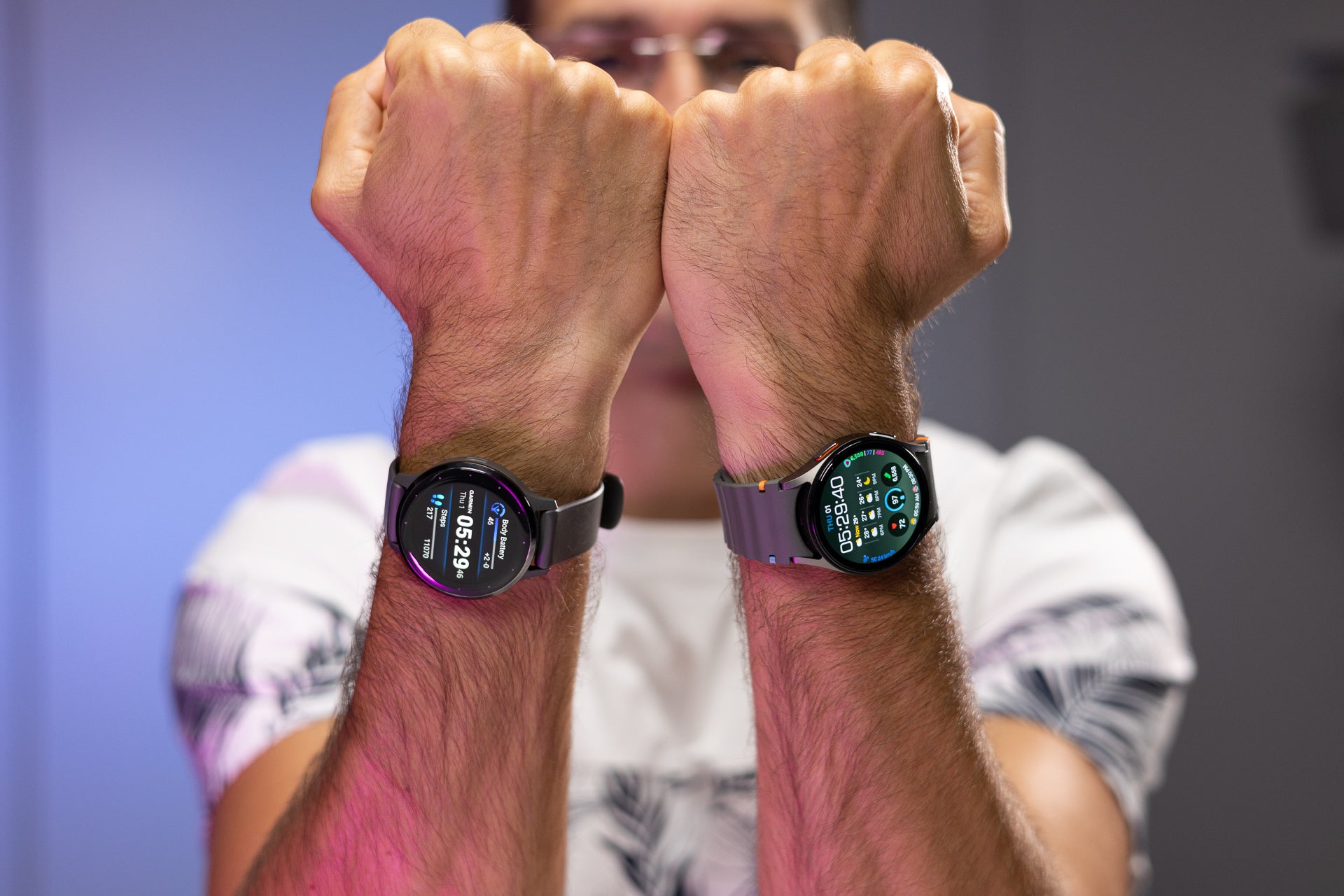
Both are comfortable, but the Garmin weighs next to nothing (Image by PhoneArena)
Both with Garmin and Samsung you have a choice of two sizes, which is very welcome. If you have a smaller wrist (170mm circumference or less), you should probably look into the smaller size, while those with a mid-size and large wrists would be better off with the larger size.
With the round shape, these two also feel quite comfortable, and I personally find they look more stylish than a rectangular watch. The Garmin, however, weighs considerably less, it's only 30 grams compared to 44 grams for the Galaxy, so you often forget you are wearing it and that's great if you use it for sleep tracking.
The Galaxy has another advantage – premium materials. The sapphire glass and aluminum body elevate its style and durability, while the Garmin has a plastic body and the glass on it is Corning's Gorilla Glass 3, not as durable. In fact, we have quite the noticeable scratch on the Garmin, so you have to be extra careful with it.
In terms of buttons, you have two buttons on the Galaxy and three buttons on the Garmin. Neither are ideal for sporty people, and you still need to rely on swipes and taps most of the time. Garmin's more sporty watches have five buttons for easy navigation, but not the Venu 3.
Both the Garmin and Galaxy have the same 5ATM water resistance and are swim-proof.
Bands
Both can take any traditional spring bar strap, but the Galaxy Watch also supports Samsung's new one-click bands
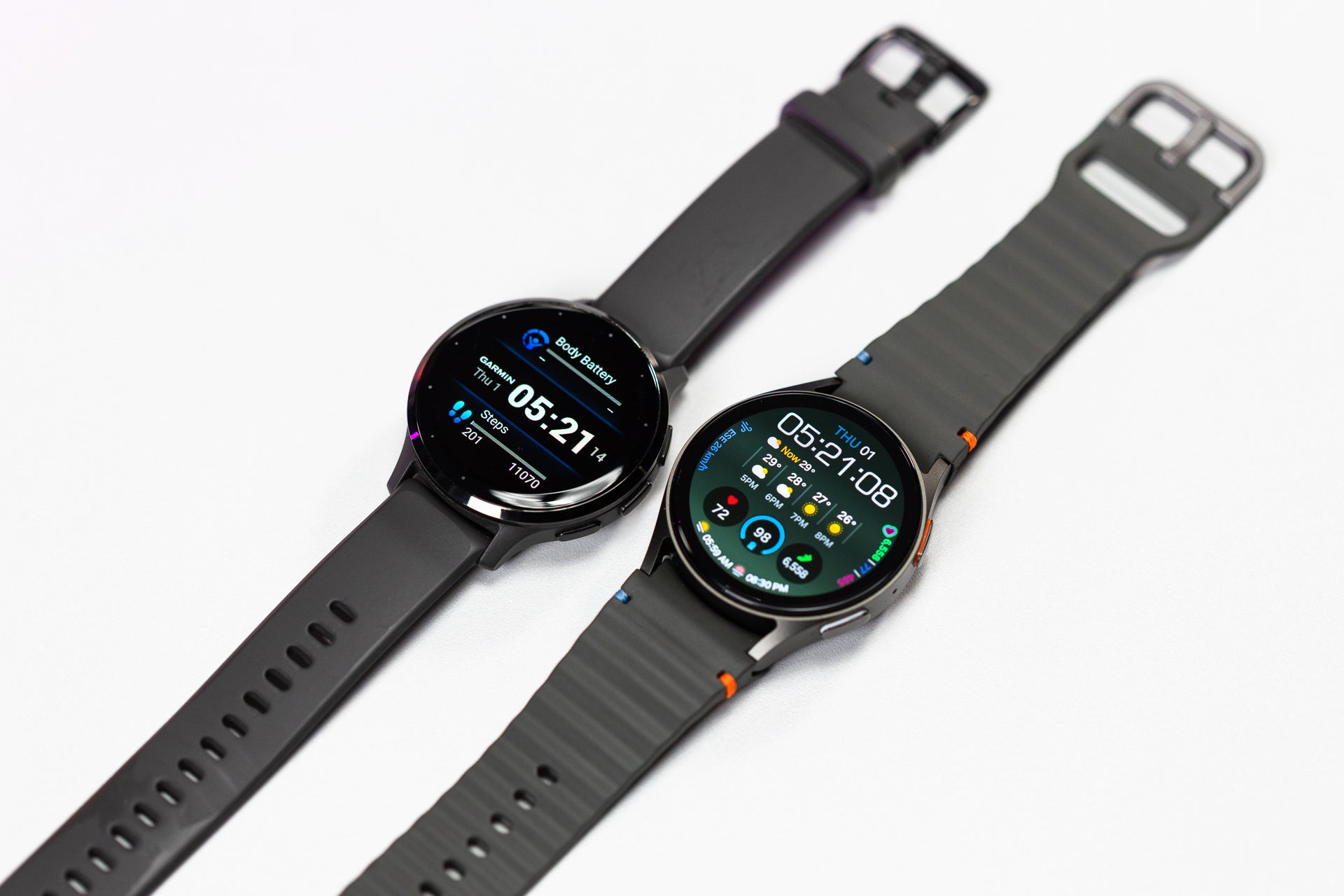
Both come with sporty bands (Image by PhoneArena)
When it comes to the straps, both come with sporty silicone straps, but the one on the Galaxy is a loop with a clever ripple design and it looks extra durable. The default band on the Garmin watch is comfortable, but it lacks a locking mechanism so I found one end gets loose easily and you have to constantly tuck it in.
Here is the breakdown of the band sizes:
- Garmin Venu 3 (45mm) uses 22mm spring bar bands
- Garmin Venu 3S (41mm) uses 18mm spring bar bands
- Galaxy Watch 7 (both models) use 20mm bands
With spring loaded bands you have the freedom to use all your older bands, but we do miss the convenience of easy band swaps from watches like the Apple Watch.
Software & Features
The Garmin OS is clunkier, but delivers great battery life; the Galaxy is the opposite
You can tell that Garmin's proprietary operating system comes from the old ages by the clunky navigation. It definitely needs a fresh coat of paint, right now even changing your watchface is a tedious process and it would have been great if you could access at least some of the functions by swiping left or right on the home screen.
We also have a big issue with the provided watchfaces. They are just not good enough! Garmin has a few cool sporty watchfaces, but they are not available on the Venu series, only on the Forerunner models, which is just inexplicable. The few options provided feel like they are made by a person who just discovered the MS Paint app. You are supposed to be able to install third-party watchfaces via the Connect IQ app, but the quality there is even worse.
The Garmin watchfaces also have very few complications and you cannot directly tap on a complication to go to that specific feature. It's just a clunky interface that you kind of have to fight.
Not so with the Galaxy Watch 7. Samsung has really stepped up its game with some beautiful watchfaces. The default one has tons of complications and feels refined. It's easy to swap complications, to customize colors, to change watchfaces, it's all quite intuitive.
We only wish we had a physical rotating bezel on the Galaxy Watch, that was such a cool feature.
Heart Rate Accuracy
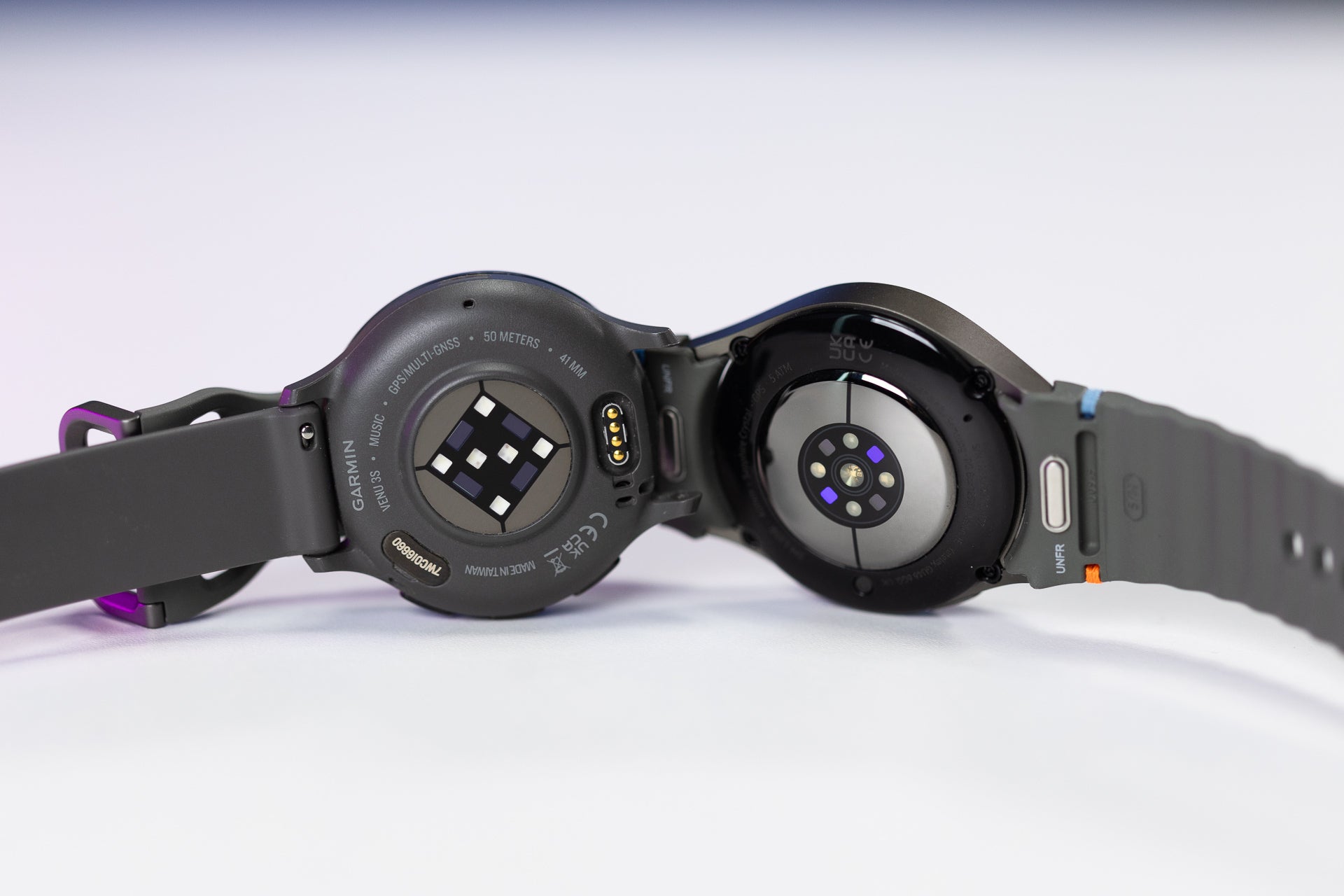
The Venu 3 has Garmin's Elevate Gen5 sensor, while the Galaxy also comes with a new BioActive sensor (Image by PhoneArena)
Okay, let's get to the meat of it! For heart rate accuracy, the Garmin Venu 3 comes with its new Elevate Gen 5 sensor, which has more green LED lights and new orange lights, plus a larger surface area to track your heart rate better.
The Samsung Galaxy Watch 7 also comes with a new BioActive sensor.
Which one is more accurate? Well, neither is perfect, but a problem we have witnessed in previous Galaxy Watches persists in this latest edition: it often overestimates HR values by... a lot! During a warm-up, the Galaxy detected heart rate of up to 140bpm, while the Garmin was way more real with values below 100bpm.
Of course, if you use these for more intense workouts like mountain biking, you will have some expected mistaken values, but we expect better accuracy with less challenging workouts.
Both watches also have support for ECG, but then the Galaxy has a few advanced features like the ability to measure your Blood Pressure (you have to calibrate it with a blood pressure cuff first).
Other useful metrics include HRV, or heart rate variability. This metric has become increasingly valuable as a predictor of disease and a warning sign that your body gives you when you need extra rest. Strangely, the Galaxy consistently detected HRV values way above the typical. While most watches estimate my HRV to be around the 40ms mark, the Galaxy Watch claims I average around 100ms, which feels out of line.
Sleep Tracking and Body Battery/Energy Score
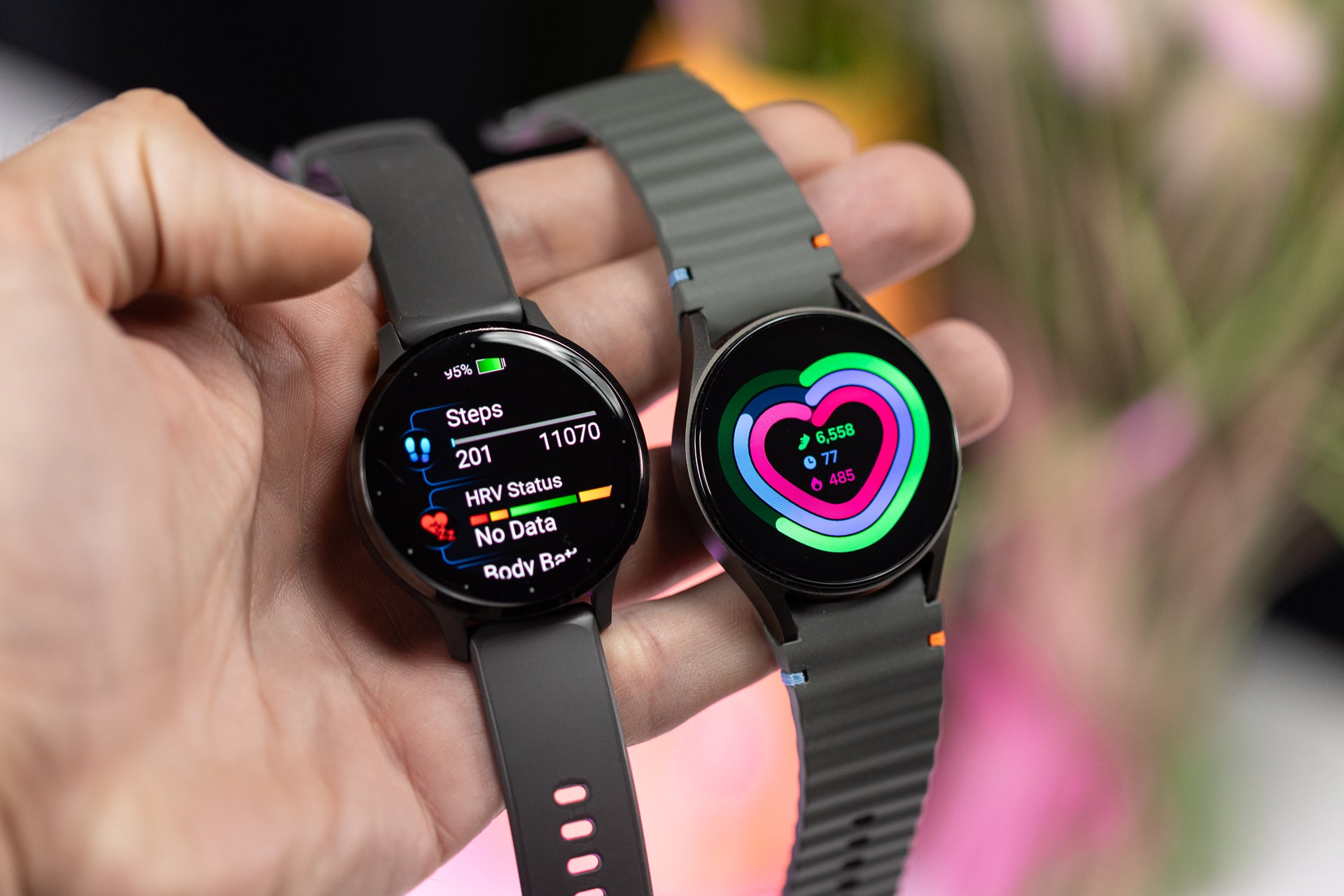
Both give you a sleep score and a detailed breakdown of sleep stages (Image by PhoneArena)
For sleep tracking, both the Garmin Venu 3 and the Galaxy Watch 7 tell you when you fell asleep, when you woke up, time in bed and a breakdown of your sleep stages, such as deep sleep, light sleep and REM sleep.
It's hard to verify the sleep stages as there are no commercial devices that measure these with perfect accuracy. However, from our experience with many smartwatches, it seems that REM sleep time and awake times on the Galaxy were a bit off.
Both watches, however, did a reasonably good job detecting sleep and wake times, which we find more important. The Galaxy, however, presents all of that data in a much tidier way in the app and Garmin again has something to learn.
We like that you get a single Sleep Score on both watches, so you can quickly tell if you've had a good night sleep or not, that's a useful metric.
One new addition to the Galaxy Watch is the so called "Energy Score", and if you ask us Samsung is just trying to copy the Body Battery metric from Garmin. Both scores are estimates you receive when you wake up to help you know how well rested and ready to train you are. Garmin also has a separate Training Readiness metric that focuses specifically on that aspect, but that one is not available on the Venu 3 and only on higher-end Forerunner and Fenix series watches.
As for the Energy Score/Body Battery, both are based on your last night sleep and previous day activities. The Body Battery changes throughout the day, so you can instantly see how your morning workout affects your energy, while that is not the case with the Energy Score on the Galaxy.
Overall, the Body Battery feels more informative, but we love that Samsung is also giving you a similar number.
GPS Accuracy
An accurate GPS on a watch is essential for proper workout tracking for runners, cyclists and many other sports. On the Venu 3, you have a single-band L1 GPS unit, while the Galaxy Watch 7 is the first Samsung watch to have dual-band GPS for increased accuracy.
That's only in theory though. We did find both were not perfect, but the GPS readings from the Garmin were just a bit better, while the Galaxy Watch 7 would for some reason show deviations.
Battery and Charging
If you want good battery life, just get the Garmin
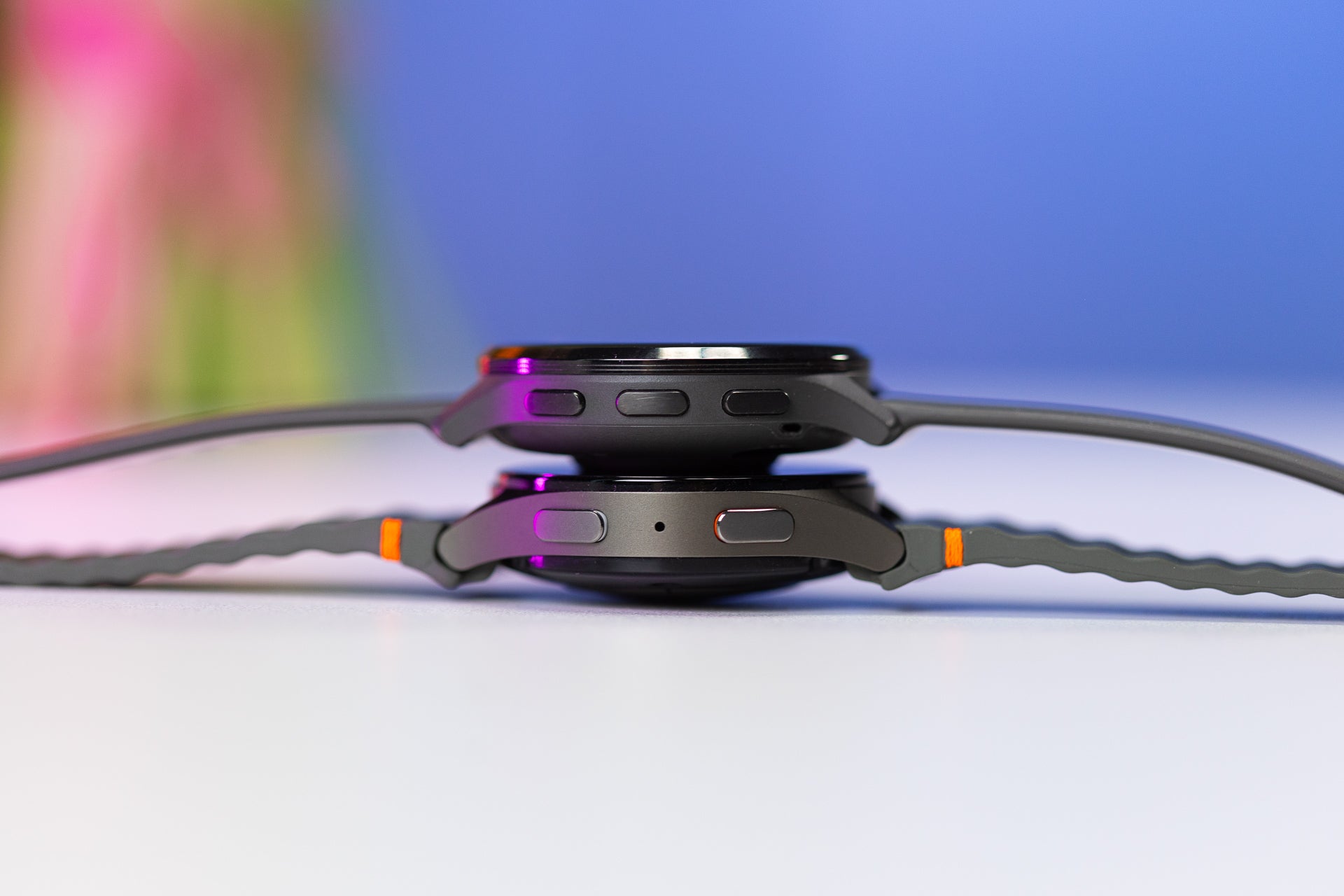
If you turn off the always-on screen, you can get more than a week of battery life on the Garmin. The Galaxy only gives you one day (Image by PhoneArena)
If you don't want to baby your watch like that, just go for the Garmin Venu 3. We have been using the smaller-size Venu 3S model, and battery life is around four days with one workout per day and the always-on screen enabled, and if you turn that off you get more than a week. That is great.
Charging is a bit more convenient with the magnetic puck you get on the Galaxy, but since you charge your Garmin so rarely, we don't mind its standard charging cable all that much.
Models and Prices
When it comes to models, the Galaxy has one advantage – you can get it with cellular connectivity and go on a run with just your watch, and still get your calls (if your carrier supports that feature). The Garmin cannot do that, it does not have a cellular-connected version.
And here are the prices for the Garmin Venu 3 and Galaxy Watch 7:
- Garmin Venu 3 / Venu 3S: $450
- Galaxy Watch 7 40mm / 44mm: $300 / $330 (add $50 for LTE cellular connection)
The Garmin is a bit pricier and it is discounted less often, while you can often find bigger discounts on the Galaxy, which makes them an even cheaper option.
Voice Calls and Haptics
If you have used an Apple Watch, you know what excellent vibration feedback feels like: sharp and tight, different for different types of notifications. None of these two is as good, but the Galaxy is the better of the two.
Specs
Before we jump to the conclusion, here is an overview of the Garmin Venu 3 vs Samsung Galaxy Watch 7 specs:
| Specs | Garmin Venu 3 | Samsung Galaxy Watch 7 |
|---|---|---|
| Models (Size, Weight, Prices) | Venu 3: 45mm, 1.4-inch screen, 30g weight Venu 3S: 41mm, 1.2-inch screen, 27g 12mm thickness on both | 40mm (40.4 x 40.4 x 9.7 mm) 44mm (44.4 x 44.4 x 9.7 mm) 28.8g weight for 40mm 33.8g weight for 44mm |
| Materials | Metal bezel, plastic body | Aluminum body Sapphire bottom |
| Processor, RAM, Storage | Unknown - 8GB storage | Samsung Exynos W940 4GB RAM 32GB storage |
| Software | Garmin proprietary OS | WearOS 5 with One UI Watch 6 |
| Battery and Charging | 14 days in smartwatch mode - Venu 3 10 days in smartwatch mode - Venu 3S Proprietary Garmin cable | 40mm 300 mAh 44mm 425 mAh |
| Sensors | Garmin Elevate V5 (Gen5): optical heart rate ECG single-band GPS | Samsung BioActive: optical heart rate ECG dual-band GPS |
Summary
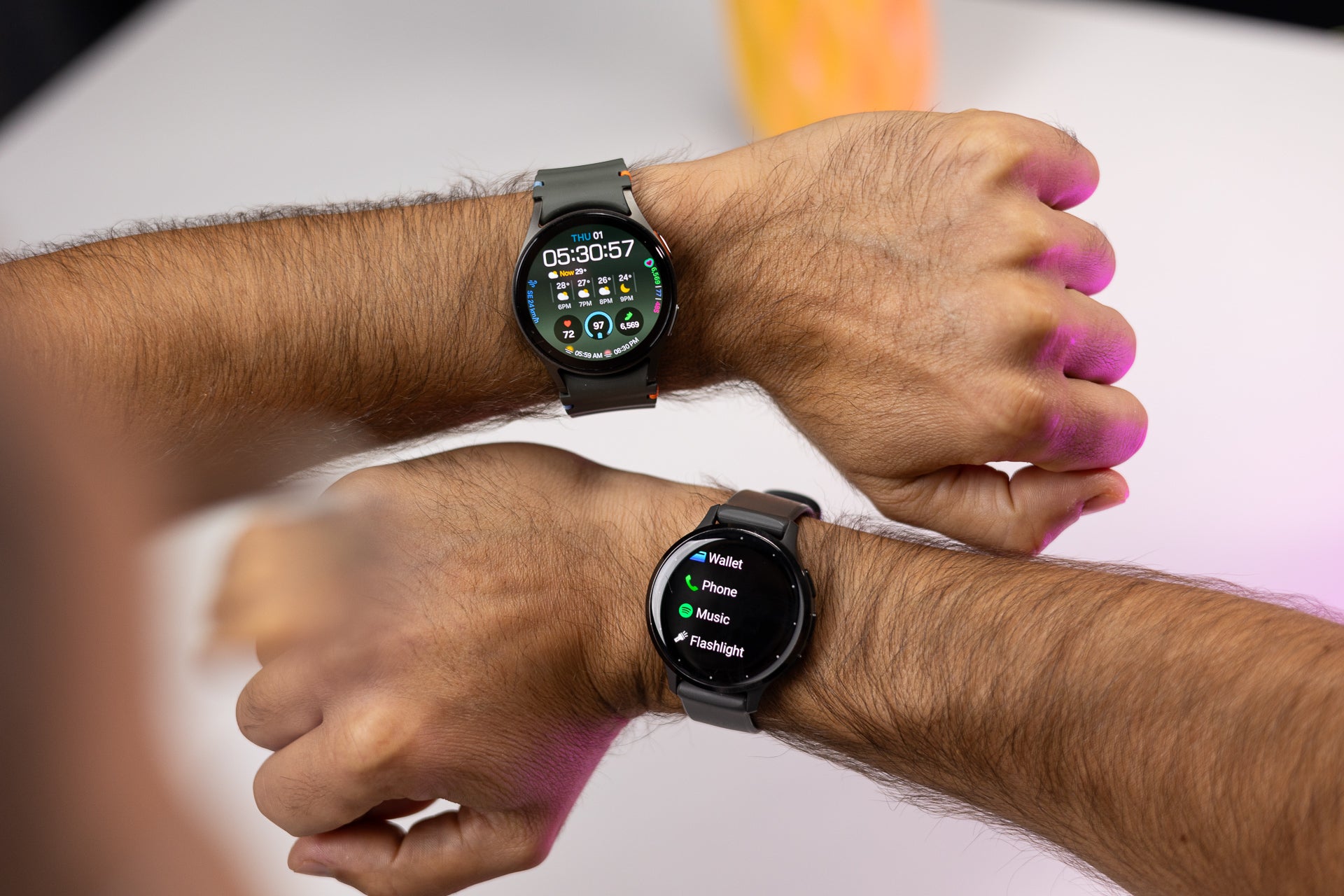
Choose your weapon (Image by PhoneArena)
Ultimately, it boils down to a few simple things.
If you want the long battery life and the slightly better accuracy of measurements, the Garmin Venu 3 is the watch to get.
If you, however, want a smarter watch with a slightly fancier look and want to pay less, then the Galaxy Watch 7 would be a better fit.
So... which team are you on: team Garmin or team Galaxy?
Follow us on Google News













Things that are NOT allowed:
To help keep our community safe and free from spam, we apply temporary limits to newly created accounts: